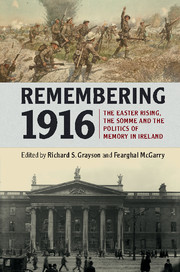Book contents
- Frontmatter
- Contents
- List of figures
- List of tables
- List of contributors
- Introduction
- Part I Memory and commemoration
- Part II Narratives
- Part III Literary and material cultures
- 8 The Rising generation and the memory of 1798
- 9 Cultural representations of 1916
- 10 Myth, memory and material culture: remembering 1916 at the Ulster Museum
- Part IV Troubled memories
- Index
8 - The Rising generation and the memory of 1798
from Part III - Literary and material cultures
Published online by Cambridge University Press: 05 March 2016
- Frontmatter
- Contents
- List of figures
- List of tables
- List of contributors
- Introduction
- Part I Memory and commemoration
- Part II Narratives
- Part III Literary and material cultures
- 8 The Rising generation and the memory of 1798
- 9 Cultural representations of 1916
- 10 Myth, memory and material culture: remembering 1916 at the Ulster Museum
- Part IV Troubled memories
- Index
Summary
The centrality of 1916 and the succeeding revolutionary period to the current Irish commemorative impulse makes it difficult to recall that this has not always been the case. In the final years of the nineteenth century and the period leading up to the Rising in the early twentieth century, the biggest commemorative events recalled the Manchester Martyrs of 1867 and, especially, the rebellion of 1798. The widespread flurry of excitement and activity surrounding the latter's centenary commemoration in 1898 contributed to the politicisation of a generation of young people, many of whom would go on to organise, execute, and witness the Easter Rising – the so-called ‘Rising generation’. But their very successes contributed to a decline in enthusiasm for commemorating the rebellion that inspired them. This chapter traces the relationship between this generation of young people and the social memory of the rebellion of 1798. It argues that the ’98 centenary helped to politicise many of the young and to model revolution for them, but that the succeeding revolutionary period of 1916–1923 nevertheless occasioned a shift in the Irish memorial tradition away from the 1798 rebellion and towards the Easter Rising. The chapter first outlines the politicising effects of the centenary and the public enthusiasm it generated on the generation of young people who witnessed it, before turning to examine the memorial turn away from 1798. Throughout, the ‘lifecycle’ of one monument in particular, the Kerry ’98 memorial in Tralee, will be particularly illustrative and serve to demonstrate the three principal reasons underlying the shift. First, the violence of the intervening years and the bleak outlook of the early Free State raised questions about the valorisation of violent national mythology; second, the grass-roots movements that initially spurred the commemorative fervour had been calcified into processes of state and bureaucracy that no longer held the same power to rally great interest; and finally, the Rising itself and the memory of the ‘Rising generation’ mingled with and ultimately displaced ’98 in the commemorative landscape.
In the increasingly tense political environment of the Home Rule debate and land reforms at the end of the nineteenth century, the ’98 centenary offered an occasion to draw together disparate factions of Irish nationalists in support of unified commemorative efforts and to introduce young people to the politics of national remembrance.
- Type
- Chapter
- Information
- Remembering 1916The Easter Rising, the Somme and the Politics of Memory in Ireland, pp. 155 - 167Publisher: Cambridge University PressPrint publication year: 2016

